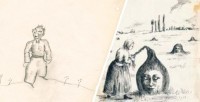In an effort to assist in the recovery of materials missing as a result of the Carnegie Library theft, the ABAA would like to bring to the public's attention the list of items believed stolen. Click this link to view the list. Update 8/20/18: The following list includes more details. Should any member of the public identify having purchased or otherwise having knowledge of the disposition or current location of any items from the Carnegie Library—whether on this list or not—please contact one of the following detectives from Allegheny County District Attorney's Office: · Det. Fran Laquatra (412) 388-5305 flaquatra@alleghenycountyda.us · Det. Perann Tansmore (412) 388-5307 ptansmore@alleghenycountyda.us ` · Det. Lyle Graber (412) 388-5316 lgraber@alleghenycountyda.us Please note, the detectives do not have reason to believe that anyone who may have purchased any of these items was necessarily aware that the material had been reported stolen. The ABAA appreciates your attention and assistance with respect to this grave matter. Please check our post from March for further details, including additional information on collection markings. Sincerely, Vic Zoschak President, ABAA Brad Johnson Chair, ABAA Security Committee Susan Benne Executive Director, ABAA [more Carnegie Library Theft]
Bookseller News
ABAA-member Weller Book Works turns 90! Anniversary celebration for the Salt Lake institution, Saturday, August 17, from 4 - 6 PM! Who'd have thought a small used bookstore founded two months before the 1929 stock market crash would grow into one of the West's premier bookstores? Weller Book Works survived the Great Depression, World War II, a catastrophic fire (1971), big box chain stores, and the disruption of the internet. Founded in August, 1929, in Salt Lake City by Gustav Weller, the store began as Zion's Bookstore. It has gone through many changes and four generations of Wellers over the years, and it continues today as Weller Book Works. (Read the complete history...) Weller Book Works is the oldest bookstore in Utah, and one of the oldest in the country. For 90 years, Weller's has been cultivating ideas, challenging thoughts, and encouraging a little bit of anarchy. As part of their 90th-anniversary celebrations, they are going to look back on that history, and discuss what the next 90 years may hold in store. A celebration will be held on Saturday, August 17, from 4- 6pm. Remarks by Tony Weller, Rocky Anderson, and Brooke and Terry Tempest Williams begin at 4:30pm; music will be provided by Philip Miller; and, there will be cake -- and hors d'oeuvres, too! Weller Book Works have also created an exclusive reusable tote bag featuring a one-of-a-kind design by Pat Bagley made especially for this occasion! You'll get a chance to meet up with old friends, and hopefully m... [more Weller Book Works Turns 90]
I was thrilled recently to learn, via John Windle, of the philanthropic activities of ABAA member Phillip Pirages and his wife Ellen Summerfield. The couple formed the Give a Little Foundation in 2007 with the mission to provide assistance to individuals and families in Yamhill County, Oregon who are experiencing financial adversity and to alleviate hardship and enhance the quality of life of those on very limited budgets. The foundation offers one-time grants of up to $500 to help residents in crisis, and it has other special outreach programs in place to help school children, job seekers, and seniors. Phil and Ellen were moved to give back to their local community after identifying a need through their professional acquaintances and social services organizations. From the beginning, they have worked with existing organizations who had the infrastructure in place to identify and evaluate individuals who were on the cusp—that is, people who perhaps needed equipment, tools, licenses, school supplies, or even rental deposits to bridge a gap to gainful employment, success in school, or other needs. Working with these front-line agencies allowed the foundation to respond quickly by assisting the neediest cases. To be certain that funds are used properly, grants are made directly to the vendor or service provider involved, rather than the applicant. In recent years, ABAA members John Windle, Chris Loker (of Children's Book Gallery), and Lawrence O'Shaughnessy (of Franklin Books)... [more ABAA Member Phillip Pirages Gives Back to his Oregon Community]
The ABAA's Woodburn Fund provides financial support for scholarly research and education relevant to the antiquarian book trade. This includes annual scholarships to Rare Book School, California Rare Book School, and the Colorado Antiquarian Book Seminar. Ezra Tishman of Aardvark Books/Ezra the Bookfinder was the recipient of a Woodburn Fund scholarship to Rare Book School this year and had the following to say about his experience. I wanted to take moment to officially thank the ABAA for the scholarship assistance I received to attend a Rare Book School course in Bloomington, Indiana. The assistance allowed me to take the time off from work, and I spent an amazing week at Indiana University's Lilly Library, learning from the legendary "Master of Bibliographical Resources", Joel Silver. His encyclopedic knowledge of available references -- and his folksy delivery of just a slice of his vast body of knowledge — rather blew me away. In the first two days of the course — despite twenty-five years fulltime in the trade, I truly wondered about what I really knew, and how I could have worked so long without the benefit of some of these resources. I've no doubt at all that what I gained from attendance at Joel's course will prove indispensable, in both my capacities as bookseller and appraiser. Again huge gratitude to our organization for its commitment to help members grow and thrive in the trade. Scholarships to Rare Books School and California Rare Book School are awarded ann... [more Woodburn Fund Scholarship Recipient on Rare Book School]
ABAA-member Claudia Strauss-Schulson, her son Todd and daughter Caren, have written a book -- Scrawl: An A to Z of Famous Doodles -- based on the extensive collection of illustrated letters and sketches built by the late David Schulson, founder of David Schulson Autographs, Ltd. (now Schulson Autographs). We asked the three Strauss-Schulsons to tell us about the book and the collection on which it draws. ABAA: How did this collection come about? Claudia Strauss-Schulson: The collection began with the intent to combine art with history. The collection built out from illustrated letters to include drawings of all sorts from the full range of human endeavor. The criteria for selecting a letter or drawing for the collection had to do with adding diversity and curiosity as the collection grew. ABAA: How large is it? Claudia: Larger than the number of pieces in Scrawl. ABAA: You must come across doodles and marginalia all the time in your area of specialty. What gave you the idea to turn the collection into a book? Todd Strauss-Schulson: In the months after Dad died, Caren and I had the idea of turning the private collection into an art book. Dad loved this material, and we grew up with it. The exciting part was not to do another historical book of letters, not academic or stuffy. We wanted to do an art book that contextualized this material as art objects, as we had learned from him. Caren Strauss-Schulson: Our dad was the perfect balance of serious and playful, and Rizzoli comple... [more Collection: Famous Doodles]
Meet the latest members of the Antiquarian Booksellers' Association of America. New Members Lillian Fraker, Savoy Books (Lanesboro, MA) Lillian Fraker was born in New York, grew up in Westchester County and met her husband-to-be, Robert Fraker in college. In 1971 they settled in a rural town in Massachusetts' Berkshires where they started Savoy Books, later moving home and business to Lanesboro, Mass. They kept a general stock of pre-1900 books and paper, specializing in antiquarian horticulture/agriculture, and 19th-century American popular music, and putting together various quirky subject collections -- history of Shorthand, American education, etc. Savoy Books joined the ABAA under Robert Fraker's name in 1974, exhibiting in every Boston ABAA book fair since then, and in the 1970s and '80s participating in a few New York and California fairs. When Robert died in 2017, Lillian Fraker applied for ABAA membership under her own name. She still has a medium-sized stock of antiquarian books, pamphlets, broadsides, graphics and other ephemera for sale and is happy to be able to continue her 45-year connection with the ABAA community. Elena Gallego, Elena Gallego Rare Books (San Antonio, TX) Elena Gallego Rare Books LLC operates from its offices in Madrid and Texas and aims to get professionals, collectors, and lovers of unique artworks closer to the exciting world of the rare books and manuscripts. They specialise in Spanish books, Central and Latin America, and México. Their d... [more New Members]
In honor of long-time member Florence Shay (1922-2012), the Midwest Chapter of the ABAA offers an educational scholarship to booksellers from the Midwest Chapter region to attend the 2019 Colorado Antiquarian Book Seminar. It covers full tuition plus room & board expenses for one attendee to this year's Seminar. All applications must be received by midnight, May 01, 2019. Applicants will be notified of the award decision via email on or before May 15, 2019. Each application must include at least one written letter of support by a professional bookseller or rare book librarian, as well as the applicant's biography and essay. These can be submitted via email to the Scholarship Committee Chair at chairmwabaachapter@gmail.com or by regular mail to: Daniel Weinberg, Abraham Lincoln Book Shop, Inc., Ste. 100 824 W. Superior St., Chicago, IL 60642. To apply for The Florence Shay/Midwest Chapter CABS Scholarship please provide the following: • A completed copy of the application form. • A personal biographical statement or essay (no longer than two pages) in which you describe your past or current experience in the world of antiquarian books, your goals for the future, and what you hope to gain from the studies afforded by this scholarship. If you have attended an antiquarian book fair in the past, please offer an observation or impression gained from that experience. • Letter of support written by a professional bookseller or rare book librarian. Click here for additional info... [more The Florence Shay Scholarship to the Colorado Antiquarian Book Seminar]
Longtime ABAA member John J. DeMarco of Saratoga Springs, NY passed away on March 26, 2019. He was 70, and was being treated for cancer. His store, Lyrical Ballad — which DeMarco opened after graduating from college in 1971 and ran with his wife Janice — has been a fixture in Saratoga Springs for almost 50 years, and is “hog heaven for a book lover,” according to fellow ABAA member Kevin Mac Donnell. Saratoga Springs Mayor Meg Kelly paid tribute to DeMarco's resiliance through decades of economic ups and downs, saying “Lyrical Ballad outlived most of the big box stores and really was the foundation for much of the revitalization of Saratoga Springs. His store survived it all due to the strength of his personality.” DeMarco had a knack for uncovering some truly rare items over the years, such as a cache of Herman Melville material that included letters from Nathaniel Hawthorne and a first draft of Typee, that a local widow had found amid other material in her barn. Several friends and contemporaries remarked on his reputation for supporting every civic-improvement and artistic project in Saratoga Springs; his friend and fellow business owner Gordon Boyd said DeMarco "was just a priceless community leader and an example for all other business leaders." Several regional newspapers have published articles on DeMarco this week, and the Yaddo writers' colony also marked his passing with a tribute on their Facebook page. Schenectady Daily Gazette: “Longtime owner of Ly... [more In Memoriam: John J. DeMarco]
ABAA-member Frank S. Klein passed away at his home on January 12, 2019. Obituary: Upon graduation from Cuyahoga Falls High School during World War II, Frank was drafted into the Army. Following his discharge he enrolled at Kent State University where he excelled not only scholastically but also athletically as an outstanding tackle on their varsity football team. Frank, with other Kent students, founded Phi Gamma Theta Fraternity that later merged with Phi Delta Theta. He taught a few months, then decided to pursue a military career. His ROTC training at Kent State qualified him to enlist as a lieutenant in the Army's officer training program and he quickly rose through the ranks. He served in Korea and in Vietnam. Frank retired in 1970 as a Lieutenant Colonel working at the Pentagon in Army Aviation. He then took over operation of The Bookseller, Inc., a shop specializing in used and rare books that he and his father had established in the 1940s. Frank's daughter Andrea now operates The Bookseller, Inc. located in the Wallhaven area. Until his health failed, Frank was very active in several book-related organizations. With some colleagues he founded NOBS (Northeast Ohio Booksellers Society). He was a member of the ABAA (Antiquarian Booksellers Association of America) and was recognized locally and nationally as an expert in the field of antiquarian books and ephemera. (Read the full obituary at Legacy.com...) Friend and fellow ABAA-member Andrew Cahan shared this touching me... [more In Memoriam: Frank Klein]
An announcement from the Northern California Chapter of the Antiquarian Bookseller's Association of America: Announcing the Winners of the inaugural California Young Book Collector's Prize. The quality of all of the applications made it extremely difficult to choose the winning candidates, and the committee would like to extend its sincere thanks to each and every applicant who took the time and effort to apply. Our third place award went to Megan Messinger, from Pomona. Her collection “is an attempt to bring together my two great loves” – medicine and theater. While these two interests may seem very far apart, Megan has found a place where they merge: in the staging of violence. A former fight choreographer and teacher of stage combat, the merging of medicine and theater has deepened her understanding of “the place of violence in society; why it is staged the way it is, both now and in the past; and how performances of violence and medicine are two sides of the same coin.” The second place award was given to Jessica Jordan of Palo Alto. Jessica's collection revolves around the love of the artwork, and illustrations, of an interracial couple – Leo and Diane Dillon. The couple faced many barriers when they first began to build their life and joint career together; but by the time of Leo Dillon's death in 2012, they had become known as two of “the world's pre-eminent illustrators for young people”. The Dillons were the only consecutive winners of the Caldecott M... [more CA Young Book Collector’s Prize Winners]









